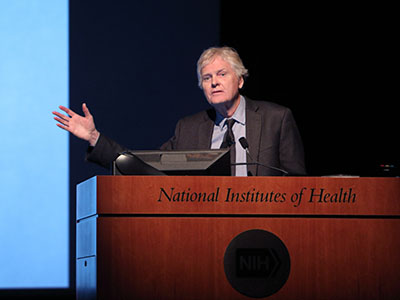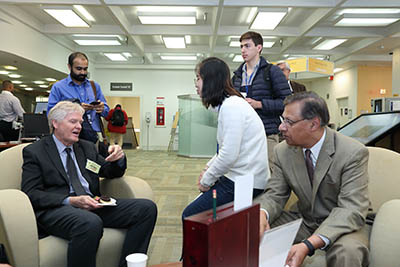Nobelist Michael Young Delivers WALS Lecture
Describes His Work on Investigating Genetic Regulation of Biological Clocks
In December 2017, a team of three scientists, Jeffrey C. Hall, Michael Rosbash, and Michael W. Young, were honored with the Nobel Prize in Physiology or Medicine for their discoveries of molecular mechanisms controlling circadian rhythms. In October 2018, one of them came to NIH to talk about his work as part of the Wednesday Afternoon Lecture Series (WALS): Michael Young.

CREDIT: CHIA CHI CHARLIE CHANG
Nobelist Michael Young gave a WALS lecture At NIH recently.
Young, who is a professor and vice president for academic affairs at the Rockefeller University (New York), investigates the genetic regulation of biological clocks. These clocks are active in most animal tissues and establish daily rhythms in physiology and behavior. In the 1970s, his lab began working with fruit flies (Drosophila melanogaster) to explore the molecular bases of circadian rhythms. The lab discovered six genes involved in the formation of a biochemical oscillator with a periodicity close to 24 hours. Interactions among these genes, and among their proteins, contribute to a network of molecular oscillations that emerge within most tissues at the level of single cells. Most of the flies’ clock genes discovered by Young and his colleagues are also central to the circadian pathways of vertebrates.

CREDIT: CHIA CHI CHARLIE CHANG
Young chatted with WALS attendees at a reception in the NIH Library after his lecture.
His lab’s findings have implications for sleep and mood disorders as well as for dysfunctions related to the timing of gene activities underlying visual functions, locomotion, metabolism, immunity, learning, and memory.
To watch a videocast of Young’s WALS lecture, held on October 17, 2018 (NIH only), go to https://videocast.nih.gov/launch.asp?26125.
This page was last updated on Tuesday, April 5, 2022
